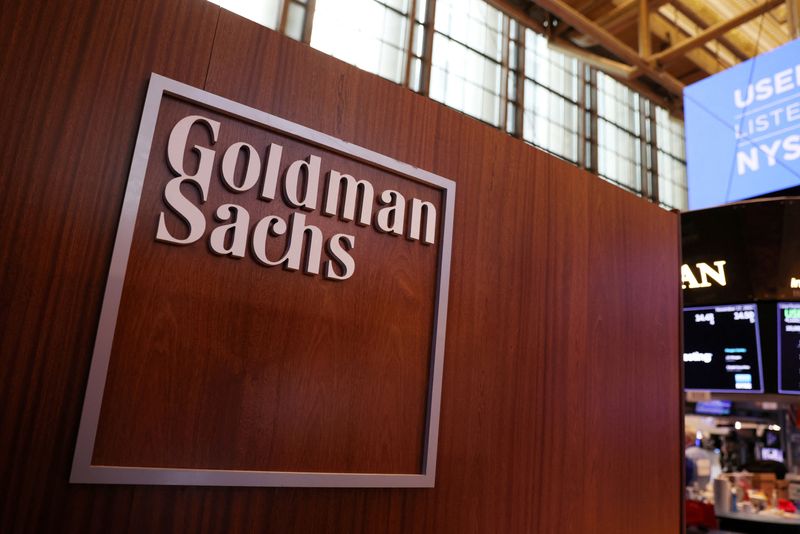By Echo Wang, Lananh Nguyen and David French
NEW YORK (Reuters) - As SVB Financial Group wrestled with a capital shortfall and the prospect of a downgrade to its credit rating last week, it went to Goldman Sachs Group Inc (NYSE:GS) and worked out an unusual two-part plan, according to people familiar with the discussions.
The investment bank would buy a $21.5 billion bond portfolio from SVB to boost its coffers, after startups began pulling their deposits from the technology-focused lender, which does business as Silicon Valley Bank.
But there was a hitch. Goldman's offer for the portfolio was worth $1.8 billion less than the book value SVB had assigned to it, because a rise in interest rates had made it less valuable. SVB would have to book a loss on the portfolio, which comprised U.S. Treasuries and related bonds.
The next step was for Goldman to put together a solution. It would help organize a $2.25 billion stock sale for SVB to fill the funding gap caused by the bond portfolio sale, two of the sources said.
Goldman delivered on only the first step of that plan. Once the bond portfolio deal was completed, the storied investment bank didn't have time to convince investors to lock in capital and overcome concerns about depositors pulling money out of SVB.
The tight turnaround left insufficient time to prepare materials for investors by early last week, one of the sources said. The stock sale collapsed and SVB became the largest U.S. bank to fail since the 2008 financial crisis, fueling concern about other lenders and prompting regulatory interventions to backstop customer deposits.
Yet for Goldman, the botched deal had a silver lining. The bond portfolio it acquired from SVB is now worth more, based on the drop in Treasury yields since the transaction happened. Traders not affiliated with the deal that were interviewed by Reuters estimated the gain in value to be in the hundreds of millions of dollars. A source familiar with details of a hedge that Goldman's trading desk put on the deal said the gain would be less than $100 million.
It is unclear whether Goldman has held onto all or part of the bond portfolio or sold it. Goldman declined to comment. SVB did not respond to a request for comment. In a regulatory filing on Tuesday, SVB said its bond portfolio sales to Goldman were done at "negotiated prices".
Goldman was not paid the underwriting fee it had agreed for the stock sale because that deal fell through, two of the sources said. SVB has not disclosed how much that fee would have been.
Details provided by six people familiar with the attempted capital raise show that Goldman and SVB underestimated the challenges of pulling off the capital raise in terms of timing and investor interest. Only two private equity firms were ultimately invited to participate in the capital raise last week - General Atlantic and Warburg Pincus. SVB and Goldman hoped stock market investors would chip in for the remainder, four of the sources said.
Warburg Pincus turned down the deal, however, because it needed more time to carry out due diligence after it became concerned that SVB could still face long-term funding issues, two of the sources said. General Atlantic pledged $500 million, but walked away when the capital raise fell through.
Warburg Pincus and General Atlantic declined to comment.
The banks also miscalculated how investors would react to the stock sale. One of the sources said the company believed that investors would welcome the plan as a boon to SVB's financial health, but it backfired and instead sent a worrying signal that triggered a 60% plunge in the bank's shares. The mood of investors was already tense after another bank advised by Goldman, cryptocurrency-focused bank Silvergate Capital (NYSE:SI) Corp, collapsed the day before.
The handling of the SVB deal by Goldman, the most prolific dealmaker based on league table data, has attracted Wall Street's fascination and invited scrutiny.
Michael Ohlrogge, associate professor at the New York University School of Law, said that while Goldman may not have handled everything "exactly right", it had taken on a difficult assignment to begin with. "(SVB) had gotten themselves into such a risky position," Ohlrogge said.
UNDISCLOSED ROLE
SVB did not disclose in its stock sale prospectus to investors that Goldman was the acquirer of the bond portfolio it sold at a loss. But in the prospectus, SVB did mention other relationships and potential conflicts of interest, such as SVB's investment banking arm underwriting the deal.

SVB disclosed Goldman's role as acquirer of the bond portfolio only on Tuesday, the last day of a four-business day window that the U.S. Securities and Exchange Commission (SEC) affords companies to make such disclosures. Five securities lawyers interviewed by Reuters said that SVB's handling of the disclosure appeared to comply with the rules.
An SEC spokesperson did not respond to a request for comment.